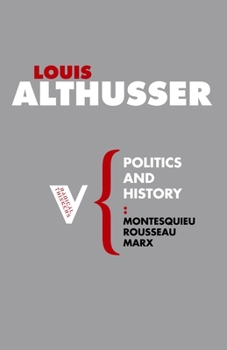Politics and History: Montesquieu, Rousseau, Marx
(Book #15 in the Radical Thinkers Series)
Select Format
Select Condition 
Book Overview
In the first two essays of this book, Louis Althusser analyses the work of two of the greatest thinkers of the Enlightenment - Montesquieu and Rousseau. He shows that although they made considerable advances towards establishing a science of politics, particularly in comparison with the theorists of natural law, they nevertheless remained the victims of the ideologies of their day and class. Montesquieu accepted as given the political notions current in French absolutism; Rousseau attempted to impose by moral conversion an already outdated mode of production. The third essay examines Marx's relationship to Hegel and elaborates on the discussions of this theme in Althusser's earlier books, For Marx and Lenin and Philosophy . Althusser argues that Marx was able to establish a theory of historical materialism and the possibility of a Marxist philosophy of dialectical materialism not simply by turning his back on Hegel, but by extracting and converting certain categories from Hegel's Logic and applying them to English political economy and French socialist political theory.
Format:Paperback
Language:English
ISBN:1844675726
ISBN13:9781844675722
Release Date:January 2007
Publisher:Verso
Length:192 Pages
Weight:0.45 lbs.
Dimensions:0.6" x 5.2" x 7.8"
Customer Reviews
2 ratings
includes Althusser's first book and important essays
Published by Thriftbooks.com User , 16 years ago
I would concur with the previous reviewer that while this is a worthy re-issue the collection Philosophy and the Spontaneous Philosophy of the Scientists includes one of Althusser's most important works (and, more importantly, is much more difficult to find second-hand) and should have been re-issued before this one. As I have all of Althusser's work in English my own concern is to have more translations done, but it's always good to have old translations reprinted for new readers. 'Elements of Self-Criticism' is perhaps the most urgent of all of those, although you can find all of the pre-1990 translations on the web if you can use a search engine. However, the importance of the short book (Althusser's first book, from 1959) on Montesquieu and the essay on Rousseau should be recognised. As G.M. Goshgarian has pointed out in his introduction to the most recent Verso collection (Philosophy of the Encounter: Late Writings, 1978-1987) those two writings definitely represent a thread within Althusser's work which came to the fore in the late writings, and a thread that was also there (if not seen by most readers) alongside other tendencies within Reading Capital and For Marx. The essay on Marx and Hegel is a minor text, but well worth reading, especially alongside Lecourt's essay on the same theme (translated in the final issue of Theoretical Practice - now that's hard to find!) and the essay on Lenin and Hegel (available in the Monthly Review Press publication Lenin and Philosophy). While many would have bought this second-hand while it was out-of-print all of those years, it is good to have this collection available for those who are only discovering Althusser now following the publication of Machiavelli and Us, Philosophy of the Encounter, and other "posthumous" texts. Now if Verso would only provide a translation of "On Reproduction" ...
A valuable reissue, but a relatively minor work
Published by Thriftbooks.com User , 16 years ago
First issued by Verso/NLB in 1972 (under a slightly different subtitle which included Hegel), this is a useful collection of Althusser's readings of some towering figures in intellectual history -- but not at all a major statement of Althusser's own thought. It contains three essays initially published in journals and collections: the 1959 "Montesquieu: Politics and History" runs for the first hundred pages, the 1967 "Rousseau: The Social Contract" takes sixty pages, and the 1970 "Marx's Relation to Hegel," a very brief lecture rather than a sustained analysis, rounds out the book at just over twenty. (I suspect that NLB at the time thought an Althusser volume containing nothing on Marx might be hard to sell.) The two initial essays, which take up the bulk of the book, are from very different points in Althusser's career; the Montesquieu essay finds him still invested in the academic enterprise of reviving Montesquieu as a serious philosopher of history, while the Rousseau essay (by far the most valuable portion of the volume) is considerably more critical of its subject. Even as a great fan of Althusser's, I would not have chosen this volume from Verso's back catalogue to republish, at least not before the long-out-of-print major work Philosophy and the Spontaneous Philosophy of the Scientists: And Other Essays. But it is a useful and interesting book for students of intellectual history nonetheless.






